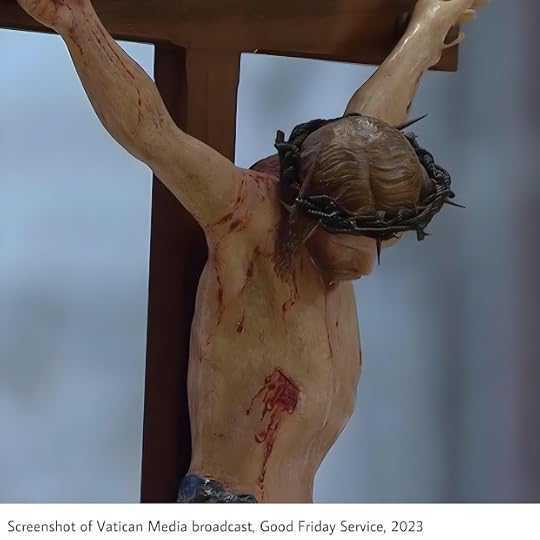John Janaro's Blog, page 24
September 28, 2024
Vincent and Francis “On the Margins”
September 27th was the feast of Saint Vincent de Paul. He began “going to the margins” in the year 1617. His followers in the “Vincentian Family” of religious congregations and societies are still serving poor, forgotten, suffering, marginalized people 407 years later.
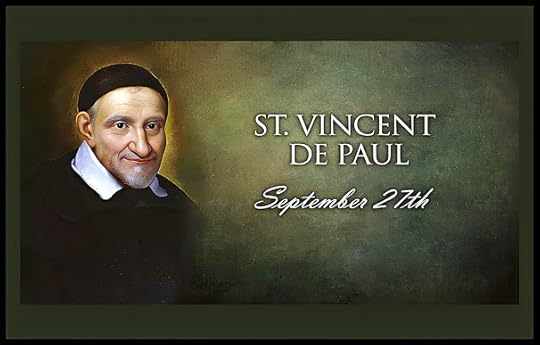
And Pope Francis continues to reach out to poor of all kinds. After a short time recovering from his inspiring pilgrimage to East Asia, the Pope embarked on another trip to Luxembourg and Belgium, historically Catholic lands that are now afflicted by many kinds of “poverty,” especially spiritual poverty. Among other things, he visited the 600-year-old Catholic University of Leuven in Belgium. His words sought to address a deeply impoverished “intellectual world,” so much in need of renewal that it might seek truth and wisdom for the benefit everyone.
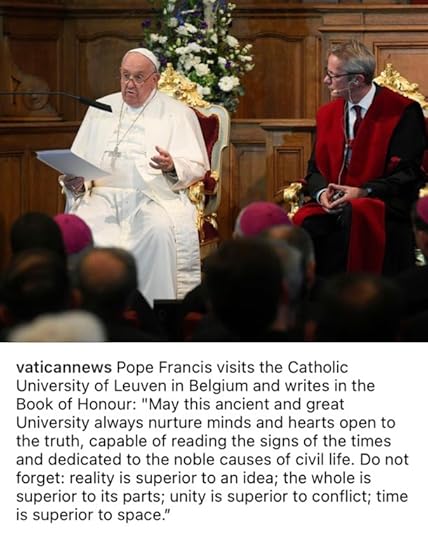
September 27, 2024
A Birthday Message For Avril Lavigne
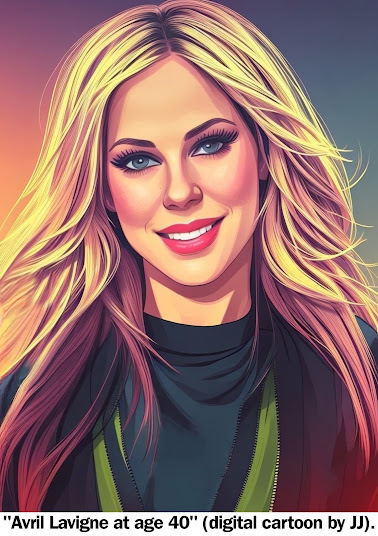 I wish you a Very, Very Happy 40th Birthday, Avril!
I wish you a Very, Very Happy 40th Birthday, Avril! (Of course you’ll never see this, but I’m still writing in a personal way…and meaning it too.)
I will always be grateful to you for the beautiful song that was born from your own suffering heart, that brought comfort to me in my own pains (due to the awful illness we both know only too well). You inspired my soul (and many others) and helped me find the words to ask “God [to] keep my HEAD ABOVE WATER” when I was drowning.
Thank you. Thank you so much.
And thanks, too, for so much amazing music you have given us!
Don’t forget that great restless heart in you that wants “forever,” that longs to “taste” the “beautiful…permanent ‘no way’!” calling out from the depths of everything. You have a beautiful heart, Avril—a heart that wants to touch the stars, that yearns for the presence of an “innocence” that is “brilliant,” that trusts a mysterious “someone” to “take [you] by the hand, take [you] somewhere new.”
You’ve been having fun being a rock star in these recent years of good health—with the Lyme disease treated and in remission—but you’ve also shared in song that there are times when the “body’s achin” and you “don’t feel alright on the inside.” Sometimes you “can’t take it, take it, take it” and you “can’t fake it” and “it’s like [you’re] running from an avalanche…”
“Whoa-ho-ho, whoa-ho-hooooo.”
Whoa-ho-ho, indeed! You always have those simple words or bending vowels (“Don’t let me drow-ie-ow-ow-n!” - for “drown”) to just “drive it home.” Yeah, I’ve felt something like those aches, that overbearing weakness, and those capricious avalanches that look like they’re going to wipe me out. I’ve often felt like that! It’s so terribly lonely, so full of a “crying out” that seems to go “unheard” by anyone around us. I believe in the God who hears this cry, but it can still be so hard…
When an artist can make a beautiful thing (a song) out of her own suffering, then especially those of us who have suffering like this in our own lives are astonished and deeply moved. The beauty is like a sign that our cry is being heard. It brings a touch of comfort to us in the midst of our afflictions. We are grateful beyond words. We will never forget you.
Avril, you have a voice that can speak deep down in people’s souls. I hope and pray that you will use that voice for many years to come. You have proven that rock’n roll can be fun, and also that it can be powerful as a way of communicating compassion—of doing works of mercy.
Happy Birthday, Avril! God bless you!!!!
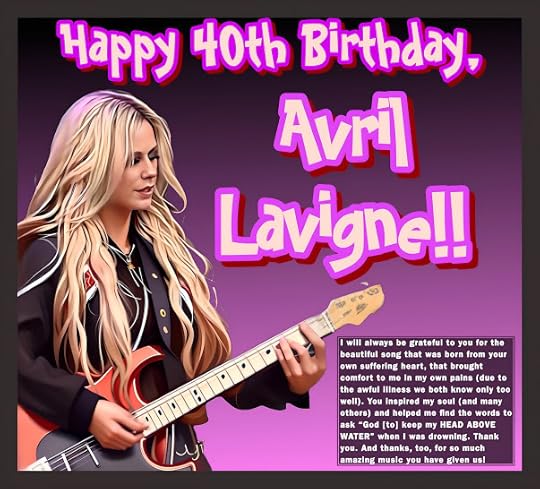
September 25, 2024
The Big Stores are BIGGER THAN EVER!
 I don’t get out and about all that much these days. I walk almost every day along the roads and rolling hills of our neighborhood, on the border between small town and countryside. We’ve lived in this house for 23 years and I’m still surprised by things I can see and hear within a 20 minute walk from my front door.
I don’t get out and about all that much these days. I walk almost every day along the roads and rolling hills of our neighborhood, on the border between small town and countryside. We’ve lived in this house for 23 years and I’m still surprised by things I can see and hear within a 20 minute walk from my front door.But with rain about to fall this afternoon, and with me still feeling the need for my walk, I decided to go with Eileen to the local Stuff-Mart. I wasn’t looking to buy anything. I just wanted to get out on a rainy day. So, I went on a “walk” around the store. It was a strange experience.
I used to drive around, shop, and go to all these stores for years, and I didn’t think much about it. But for the past six years, I have basically given up driving—I don’t trust my reflexes, for one thing, especially when I’m not feeling well. Also, ever since kids started getting driver’s licenses around here, there’s rarely been a car available for me to drive. Now they’re all living with spouses and children, or with friends, and they have their own cars. (Jojo is the only “kid” still at home, and she has a very busy social schedule. I still couldn't get a car even if I wanted one. But I don’t mind; I’m happy if I can just get out of the house every day. We live in a beautiful place.)
So, I wasn’t going much to stores. Then came the Great Plague of four years ago. I think many people have forgotten how strange that time was, and have readjusted to their “normal” hypermodern lifestyles again as if nothing ever happened. I expect, however, that more—perhaps worse—crises loom ahead for the coming generations. We simply can’t keep living this way for very long. Things have grown way out of proportion. Everything has become monstrous.
Of course I already know all about this phenomenon. I use the many-headed monster of the internet. But when you shop on the internet, there can be a false sense that shopping is still somehow a quaint matter. In spite of the fact that everything is for sale (including the information you give using websites and making purchases), internet shopping still feels like a “private” and focused exchange you carry out on you tablet or phone. Everything (including the ubiquitous advertising) is limited to a small space that you hold in your hand while surrounded by your own familiar environment.
The Big Box Retail Store, however, is not filtered by any media. It’s a monument to raw consumerism in all its enormity and immediacy. It’s designed to have “all the stuff” you could possibly desire for your material purposes. I suppose if you go in to buy specific things and you know where they are, you can ignore the surrounding mountains of other things.
But I just went in there to get a little walk while Eileen picked up a few things.
It’s GIGANTIC! These places are bigger than ever, with more sections and more shelves packed with more junk than ever.
I feel like it’s too much! We don’t need all these things to live dignified human lives. Don’t misunderstand me: I’m not claiming to be better than anyone else. I am immersed as much as anyone else in this culture-of-too-much-stuff. My house if full of too much stuff. But I’m used to my own junk. That doesn’t make it any healthier for my soul.
I walked through the store and looked at the colossal shelves of junk, and wondered how long we could continue to live this way, how long would it be before everything just blows up…
September 24, 2024
(Still) Looking Forward to Autumn
We have humid gray clouds and leaves wet and green,
Of cooler, colorful skies and foliage of light, I dream…
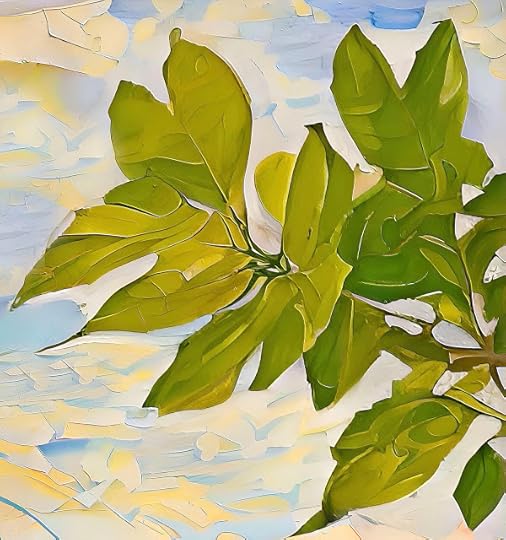
September 22, 2024
Our Earthly Path is Transfigured
 Genuine Christian faith entails the conviction that created things are good. As humans, we are meant to be "attracted" by the good in creatures, drawn to desire and love them, and drawn toward God through them, drawn to love God preeminently, who is the source and fulfillment of the being and goodness of created things. The problem is not "attraction" in itself. The problem is the mess that sin has made of our humanity. It is not that things themselves are evil; rather it is our sinful self-obsession, our drive to construct the foundation of our selves through controlling things by our own power, that skews our perception of their essential, gratuitous value given to them by God.The “world” that Jesus warns His disciples about (see e.g. John 15:18-19) is not the same as “the material world” or the created world as such. It is rather humanity’s sinful “reduction” of the meaning of creation; it is the world distorted and abused by sin (the original sin we inherit from our first parents, and our own personal sins and connivance in the dysfunctional and destructive patterns of sinfulness that weigh upon every period of human history).
Genuine Christian faith entails the conviction that created things are good. As humans, we are meant to be "attracted" by the good in creatures, drawn to desire and love them, and drawn toward God through them, drawn to love God preeminently, who is the source and fulfillment of the being and goodness of created things. The problem is not "attraction" in itself. The problem is the mess that sin has made of our humanity. It is not that things themselves are evil; rather it is our sinful self-obsession, our drive to construct the foundation of our selves through controlling things by our own power, that skews our perception of their essential, gratuitous value given to them by God.The “world” that Jesus warns His disciples about (see e.g. John 15:18-19) is not the same as “the material world” or the created world as such. It is rather humanity’s sinful “reduction” of the meaning of creation; it is the world distorted and abused by sin (the original sin we inherit from our first parents, and our own personal sins and connivance in the dysfunctional and destructive patterns of sinfulness that weigh upon every period of human history).We deserve to be called “worldly" (in this negative sense) insofar as we willingly blind ourselves to the whole reality of the created world. This world is meant to be the place where embodied persons are called to give and receive love in a multitude of "incarnate" gestures and expressions, which are made possible by the wisdom and goodness inherent in things created by God that contribute to the meaningful and precious environment He entrusts to us, and the beautiful path of our history - our journey toward Him. By contrast, “worldliness” is the result of the effort to cut off the world from God. Our "worldly desires” perceive only "worldly goods," i.e. things merely insofar as they are subject to our own selfish grasping and manipulation.
Thus we do violence to the world God has created in the gift of His love. We covet, take, steal, hoard, violate, and destroy things because we refuse to receive them and give them. When we forget the gift of God, we cannot engage reality: we don't know how to "possess" things with freedom, to learn from them, deepen them by "collaborating" with their riches and marking them with the seal of our own personal creativity, and thus being able to give of ourselves through them. We are the ones who have brought evil and destruction into the world; we have made the world a deceitful, harmful, dangerous place.
But God loves the world. He loves us. The Father reveals the depths of this love by sending His Son, Jesus, the Word made flesh, who dwells among us, accompanies us, dies for us (and thus stays with us even through death) so He can raise us up, heal us, and transform us by joining us to Himself and drawing our hearts to Him.
In following Him we are led to rediscover all the created things of the world in Him. We begin to see ourselves and all things as having their true meaning in Him and for Him. There is nothing reductive about this, because reality is ultimately personal and interpersonal. The encounter with the Person of Jesus is decisive because He fulfills and transcends (in infinite depth) every person and every thing.
In Him, our lives and everything on our earthly path is transfigured. Even though it doesn't often seem that way, as we trudge through the many difficult and lonely days in this life, we hold onto the truth in love and hope, through faith in Jesus who has gone before us in death to resurrection. Thus we learn to engage life and the reality of the world passionately, attentively, but with peace and joy in our hearts, because we know that Jesus Christ has saved the world, and that He is with us in all our days.
September 21, 2024
Saint Matthew: The Encounter With Jesus Changed Everything
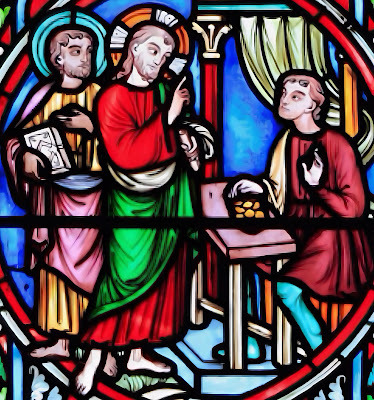 “As Jesus passed on from there, he saw a man named Matthew sitting at the customs post. He said to him, ‘Follow me.’ And he got up and followed him” (Matthew 9:9).
“As Jesus passed on from there, he saw a man named Matthew sitting at the customs post. He said to him, ‘Follow me.’ And he got up and followed him” (Matthew 9:9).This conversion story from Matthew’s own gospel is presented in similar words in Mark 2:14 and Luke 5:27 (except they give “Levi” as his name, but clearly it was the same man). Notwithstanding their brevity, these references to Matthew’s vocation are presented in a way that reveals the depths of his conversion.
The first thing that is clear is that Matthew was a public sinner in the judgment of his own people. He was an official within the complicated and corrupt bureaucracy that the Roman Empire had imposed upon Galilee by means of the “client state” of the tetrarch Herod Antipas. He was a representative of Roman imperial power, and he wielded this power in Capernaum on behalf of a puppet king installed by this foreign government. He also used it to his own advantage.
Why would anyone in Israel want to be a tax collector? The compensation for being ritually cut off and generally hated by the people was the accumulation of significant wealth. Matthew was officially responsible for providing the government with a fixed sum of money periodically from his region. In order to acquire this sum, however, he was free to set his own tax fees, collecting as much as he could get from the people. The tax collector’s position was virtually defined as the opportunity to practice unlimited graft and extortion. Above and beyond the required government sum and a fair wage for his own efforts, the tax collector used the force at his disposal to rob the population and enrich himself.
Matthew was, in fact, a thief and a criminal.
Then Jesus saw him. Jesus looked at the Mafia boss of Capernaum, who was in his “business office” (so to speak) doing his sordid work of squeezing people for money and keeping records of these “transactions.” A tax collector in Galilee (unlike the fishermen who followed Jesus) would have been literate in both Aramaic and Greek.
Jesus saw Matthew, the person, and loved that person. No doubt he also perceived that after Matthew ceased keeping records of his own extortion racket, he could begin an altogether different sort of record keeping. He could record the words and deeds of the Teacher in writing, and see that they were passed on.
Jesus saw Matthew and spoke to him: “Follow me.” Matthew had probably heard of Jesus from the people, and may have even watched his ministry. Before this moment, however, he had not conceived any hope that his life could be different.
The encounter with Jesus in this moment changed everything.
Matthew’s response was simple but had rich implications. Our text says he “got up” and followed. The Greek term used here, however, is the same word used to express Jesus’s “rising” from the dead. The power of Jesus’s gaze and his words had a miraculous effect, achieving something even more amazing than when he later “raised” Lazarus from the tomb. Jesus “raised” Matthew from the deeper deadness of sin, and invited him to become his companion. So also Jesus looks upon each one of us, and calls us to do the same.
September 20, 2024
The Witness of the Korean Martyrs
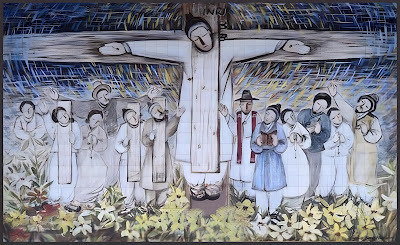 Here are a few words about the remarkable way the Gospel came to be preached in Korea, and the marvelous impact of Christ and the Church on this ancient East Asian culture beginning a little over two centuries ago. The blood of native Korean witnesses sowed the seeds of a Korean Church that remains vital today in the midst of many dangers in this volatile part of the world. In the words below—from my article in the September 2023 issue of Magnificat—I give a brief overview of the historical circumstances surrounding the birth of the Korean Church by relating the story of one of the converts of that time:
Here are a few words about the remarkable way the Gospel came to be preached in Korea, and the marvelous impact of Christ and the Church on this ancient East Asian culture beginning a little over two centuries ago. The blood of native Korean witnesses sowed the seeds of a Korean Church that remains vital today in the midst of many dangers in this volatile part of the world. In the words below—from my article in the September 2023 issue of Magnificat—I give a brief overview of the historical circumstances surrounding the birth of the Korean Church by relating the story of one of the converts of that time:Saint Mareuko Jeong Eui-Bae is one of the 103 Korean martyrs whose feast we celebrate on September 20. He is among some 10,000 Koreans who gave their lives for Christ during multiple fierce persecutions in the mid-19th century. Most were ordinary lay men and women, but some were also from the educated classes and the nobility. We know enough about the high-ranking nobleman/scholar Mareuko Jeong to appreciate the particular drama of his conversion.
Korean cultural life flourished for many centuries, creatively appropriating ancient Chinese literary and religious traditions into its own independent society. But by the end of the 18th century, the 500-year-old Joseon dynasty was in deep decline, and dependent on Qing-dynasty China. Meanwhile, the Joseon Neo-Confucian State had become a religious/political structure of rigid social hierarchy, with the monarch at the center, followed by the noble and scholarly classes, and with many of the common people reduced to a status of virtual slavery.
It was the scholar-officials who began searching for ways to reform this ossified society. In frequent diplomatic trips to Beijing, they met “Westerners” (including Catholic priests) and obtained books on developments in Western science, technology, philosophy, and religion translated into Chinese. Thus arose the “Sohak” movement—groups of scholars who studied “Western learning” and discussed its possible value for reforming Korean society. For most, it was mainly an intellectual examination of various Western ideas, but a few were drawn specifically to the Catholic faith. Yi Sung-hun was baptized in Beijing in 1784, returned to Korea, and baptized a few of his compatriots. By the time the first priest arrived in 1795 there were 4000 baptized lay Catholics waiting for him.
There was also aggressive opposition to the new teaching. The Joseon royal house and their Neo-Confucian supporters viewed Christianity as a threat to the Korean social order. Worship of One God in Jesus Christ undermined the religious/superstitious system of rites offered for the monarch and the hierarchical continuity of clan and family. Christianity preached that God was the Father of all people, who were brothers and sisters with a common destiny in Christ regardless of their origins and social status. Among the scholars who abhorred the new Christian teaching was Jeong Eui-Bae.
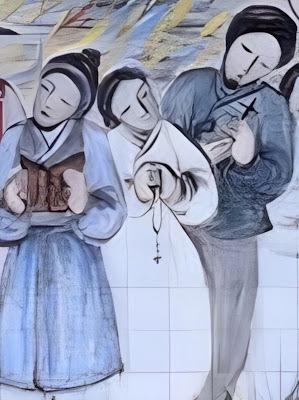 Born in 1794, Jeong was an established professor of Chinese literature and defender of the status quo when persecution broke out in 1839. By that time the French Foreign Mission Society had sent a bishop and two priests to Korea. In 1839, Jeong Eui-Bae witnessed the brutal mutilation and execution of Bishop Laurentius Imbert, Father Peter Maubant, and Father Jakob Chastan. (They are also among the 103 martyred saints.)
Born in 1794, Jeong was an established professor of Chinese literature and defender of the status quo when persecution broke out in 1839. By that time the French Foreign Mission Society had sent a bishop and two priests to Korea. In 1839, Jeong Eui-Bae witnessed the brutal mutilation and execution of Bishop Laurentius Imbert, Father Peter Maubant, and Father Jakob Chastan. (They are also among the 103 martyred saints.)The 47-year-old scholar had seen death many times. But in these three men Jeong saw something completely new: an astonishing joy in the face of torture and death. Jeong was growing old in a society where death was covered with shadows. His studies gave no hint as to how to face death, much less to embrace it with the joy he saw on the faces of those missionaries that day. Disregarding his honorable station, Jeong obtained and read forbidden Christian books and met the people who believed in the One written about in those books. Glimpsing there the Source of hitherto unknown joy and hope, the long-cynical old professor was totally converted. He was baptized Mareuko (Mark) and devoted his newfound zeal and intellectual skills to working as a catechist and caring for the sick. The poor humble people whom the former aristocrat had once scorned he now served with love until his own martyrdom in 1866, at age 72.
September 19, 2024
Happy “Janaro Family Feast Day”
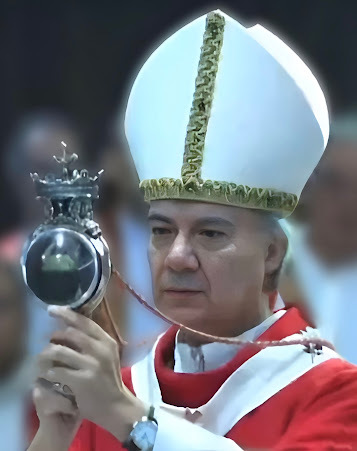 Happy "Janaro Family Feast Day"! Buona Festa di San Gennaro!
Happy "Janaro Family Feast Day"! Buona Festa di San Gennaro! Today is the Feast Day of the Great Ancestor of the Janaro Clan, the original Saint Januarius, fourth century bishop and martyr, and patron saint of Naples. Today the ancient relic of the vial of his “martyr’s blood” was presented for veneration at the cathedral in Naples by the current archbishop. Once again the blood liquified, as—according to a long historical tradition—it does almost every year on September 19. (Some Neapolitans fear that if the event doesn’t take place, the region will face calamities in the coming year... but I don’t know what the “record” is on such a correspondence, and in any case it’s not the point of this devotion.) The blood is ordinarily dry and solid in its container. I’m not one to be overly credulous about these things, but it’s notable that numerous scientific studies have been carried out, and none have been able to account for the phenomenon. For the people of Naples (including many generations of my own ancestors), the celebration of this day has brought joy and encouragement to trust in the love of Jesus for this particular ecclesial communion that dates back to late antiquity, and confidence in the ongoing solicitude of the saint who (1700 years ago) was its singularly outstanding pastor and witness to the Gospel.
This history, and the faith that pervades it, formed the lives of my family in the past, and was brought with my great grandfather and his brothers to the United States of America when they came to this “nation of immigrants” and settled in Boston and New York.
I don’t know if Saint Januarius/“San Gennaro” is actually our ancestor by kinship (like a Great Uncle X100) but distance in time renders it plausible. I’d like to imagine that he must, somehow, be related to us, what with the "Benevento" and "Naples" regional traditions and all... or there must be some connection, because "Janaro" (with the "J") is a variant in old Neapolitan dialect of "Januarius." Both of which are derived from the mythical Roman god "Janus," the "guardian of the gateways" and all places where people come in and go out (note that "January" is the first month, the end of one year and the beginning of another). Thus I hypothesize. In any case, according to Legend (and I should know, because I made up the legend) he is the patron saint of the Janaros. So, let’s celebrate!
SAN GENNARO, PRAY FOR US!!😊🎉
September 18, 2024
Rain. And Then More Rain!
Rainy days. How long has it been since we’ve had two rainy days in a row? Or even one rainy day?
Dare I say it?—“Hooray for rain!”
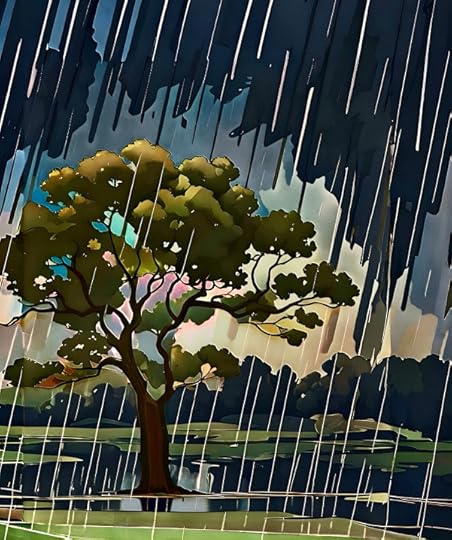
September 14, 2024
The Holy Cross: “That the World Might Be Saved…”
Jesus said to Nicodemus, “No one has gone up to heaven except the one who has come down from heaven, the Son of Man. And just as Moses lifted up the serpent in the desert, so must the Son of Man be lifted up, so that everyone who believes in him may have eternal life. For God so loved the world that he gave his only Son, so that everyone who believes in him might not perish but might have eternal life. For God did not send his Son into the world to condemn the world, but that the world might be saved through him” (John 3:13-17). .
Jesus said to the people, “Now is the time of judgment on this world; now the ruler of this world will be driven out. And when I am lifted up from the earth, I will draw everyone to myself” (John 12:31-32).
